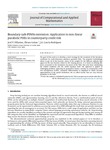Boundary-safe PINNs extension: Application to non-linear parabolic PDEs in counterparty credit risk

Ver/Abrir
Use este enlace para citar
http://hdl.handle.net/2183/32780
Excepto si se señala otra cosa, la licencia del ítem se describe como Atribución-NoComercial-SinDerivadas 4.0 International (CC BY-NC-ND 4.0)
Colecciones
- Investigación (FIC) [1685]
Metadatos
Mostrar el registro completo del ítemTítulo
Boundary-safe PINNs extension: Application to non-linear parabolic PDEs in counterparty credit riskFecha
2023Cita bibliográfica
J. P. Villarino, Á. Leitao, & J.A. García Rodríguez, "Boundary-safe PINNs extension: Application to non-linear parabolic PDEs in counterparty credit risk", Journal of Computational and Applied Mathematics, 425, 2023 [Online] doi:10.1016/j.cam.2022.115041, Available: https://doi.org/10.1016/j.cam.2022.115041
Resumen
[Abstract]: The goal of this work is to develop a novel strategy for the treatment of the boundary conditions for multi-dimension nonlinear parabolic PDEs. The proposed methodology allows to get rid of the heuristic choice of the weights for the different addends that appear in the loss function related to the training process. It is based on defining the losses associated to the boundaries by means of the PDEs that arise from substituting the related conditions into the model equation itself. The approach is applied to challenging problems appearing in quantitative finance, namely, in counterparty credit risk management. Further, automatic differentiation is employed to obtain accurate approximation of the partial derivatives, the so called Greeks, that are very relevant quantities in the field.
Palabras clave
Boundary conditions
Couterparty credit risk
Deep learning
Nonlinear
PDEs
PINNs
Couterparty credit risk
Deep learning
Nonlinear
PDEs
PINNs
Versión del editor
Derechos
Atribución-NoComercial-SinDerivadas 4.0 International (CC BY-NC-ND 4.0)






